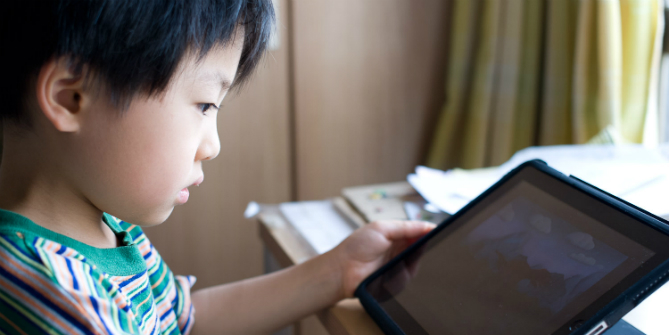Is There Such a Thing as ‘Good’ Screen Time for Young Children?
December 18, 2015
PROJECTS: Preparing for a Digital Future
TAGS: Digital Devices, Digital Parents, parenting, Screen Time
As the ParentZone holds its 2015 Digital Families Conference in London today, Sonia Livingstone reflects on her research with British families, the role of digital technologies in their lives and the challenges parents face to manage young children’s media use. Sonia is Professor of Social Psychology at LSE’s Department of Media and Communications and has more than 25 years of experience in media research with a particular focus on children and young people. She is the lead investigator of the Parenting for a Digital Future research project.
It seems every parent is highly aware of the criticisms of ‘screen time’. They are bombarded every day with rules on what’s acceptable, how much is too much or what’s appropriate for children of different ages, and the stream of headlines about kids’ exposure to violence, sex or commercial messages is hard to avoid. Yet most parents have also filled their homes with the latest devices – in the UK, even the youngest children have already used a smart phone, tablet or games console. A recent study even suggests that a third of pre-school children already have their own iPads. So parents must also believe these devices are good for their children. What do they have in mind? What is ‘good’ screen time for young children?
In my interviews with parents of children (aged three to eight) I have been struck by the huge ambivalence revealed by the contrast between enthusiastic parental purchases and consequent worries about how these devices impact on children’s development and family life. Moreover, despite the plethora of digital devices in their children’s hands, when I ask parents to tell me about a good day with the family, they invariably bring out stories of non-digital activities – going to the park or reading a book together, playing football outside or board games indoors, doing craft activities and so on. Even in this digital age, it seems that being a good parent means not using digital media!

Credit: V. Nishikawa, CC BY-NC-ND 2.0
And what is parents’ vision of the benefits that digital devices can bring? Even though they bought them, conversations with parents quickly falter when I ask them what they see as really beneficial about digital media. For sure, these devices serve as useful ways to occupy kids when parents are busy or tired, as parents will ruefully admit. And for sure, children welcome such moments, especially as it means they get to do what they really like on their digital media ‘under the radar’. But is the time kids spend with media just a kind of parental failure, more babysitting than quality time, to be confessed rather than supported?
After a very general mention of the benefits of ‘learning’ and ‘information’ or ‘staying in touch with granny’, parents often have little more to say. They struggle to recall a range of good sites for their kids. They spend a lot of time stopping them doing certain activities but much less time encouraging others. Despite all the hype about a digital future, just what kids could learn, what information can benefit them or who they might communicate with online remains confused and confusing, mixed up with anxieties about risk, and lacking trusted signposts to quality resources or recognised criteria for judging the benefits of using different sites or apps.
Parents say they would love to know of more imaginative sites that stretch and stimulate their child. They wish their child’s school would do this, and some do – though many don’t. In Germany the government funds projects to identify, test and promote great sites and apps for children, such as the search engine FragFinn or Ein Netz für Kinder. For traditional media – think of children’s books or films – parents could turn to librarians or children’s bookshops or other trusted intermediaries to advise them. My worry is that without a constructive public debate about what good screen time really consists of, parents will continue to be ambivalent about the internet. And children will continue to visit an often narrow range of sites that are either highly commercialised or made for people much older than they are.


